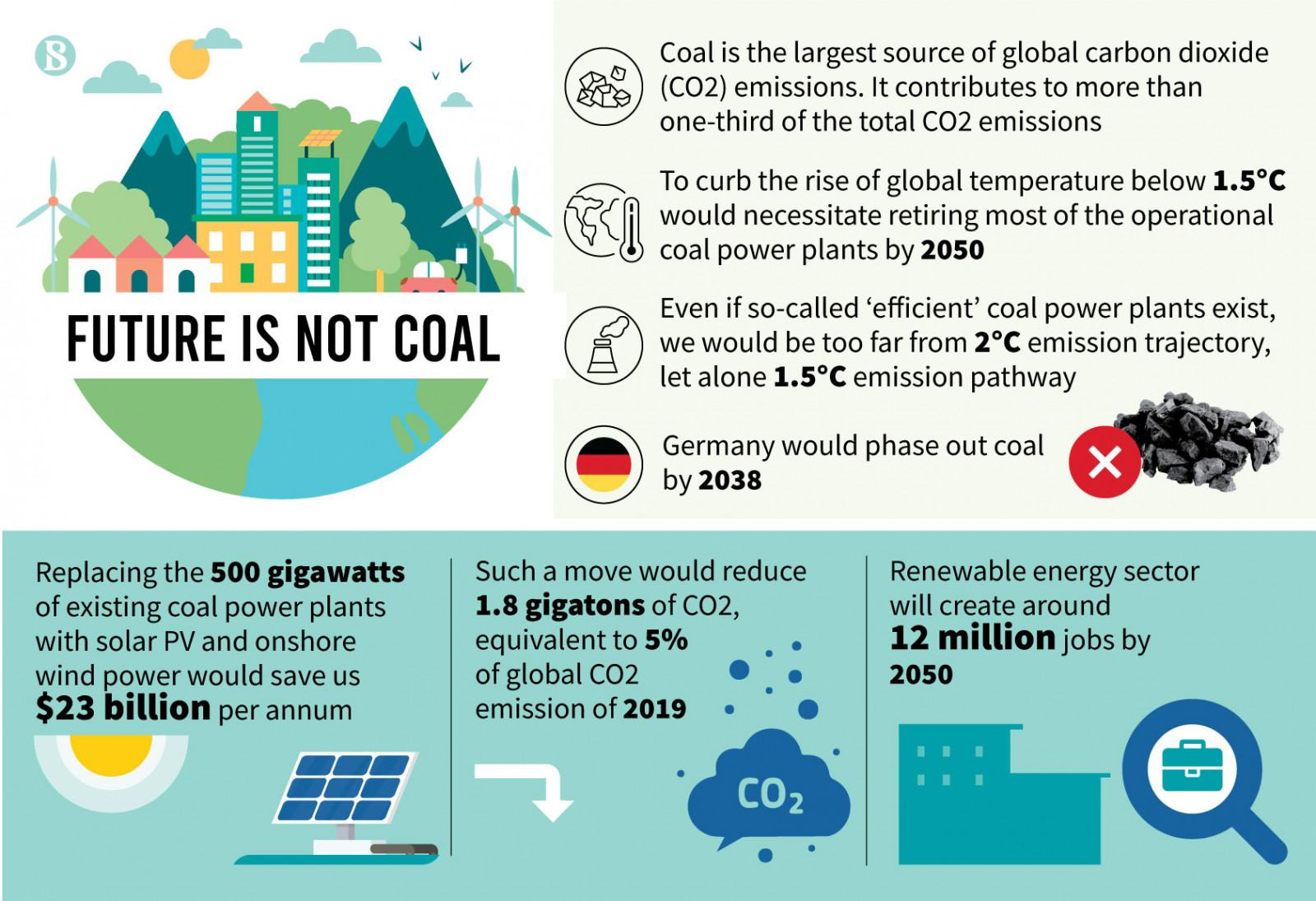Economic calculus matters: Is coal the right choice?
Replacing coal or abandoning new coal-based power plants is a no-regret strategy that would only benefit us

The goal of net-zero emission by 2050 as per the Paris climate deal would necessitate retiring most of the operational coal power plants. The special report on keeping the global temperature rise below 1.5°C prepared by the Intergovernmental Panel on Climate Change (IPCC) emphasizes that. The use of coal cannot go on unabated rather, based on the results of the IPCC report, it should peak by 2020 and reduce gradually afterwards.
From a broader perspective, containing the human-induced climate change eventually requires structural changes to reduce our economies' dependence on different fossil fuels. The consequence of this would be to keep a vast quantity of unexplored fossil fuels underground forever. As coal is notorious for, what we call, the greenhouse gas (GHG) emission, it is a fuel that remains under serious scrutiny.

Globally, the consensus of many experts, policymakers, activists, researchers, academia and civil society is to accelerate the coal power plant retiring process. Policies of many countries are also moving in that direction. For instance, Germany will phase out coal by 2038. With the tide of transition, influenced by climate and energy policies of different countries, some assets are becoming, and some will become stranded assets.
Coal-based power plants are the first ones to be stranded assets. If the expected transition does truly happen and countries shift towards the carbon trajectory of 1.5°C, coal power plants becoming stranded assets would just be inevitable in the foreseeable future.
From a different perspective, even with the so-called efficient coal power plants, we would be too far from 2°C emission trajectory, let alone 1.5°C emission pathway, as Ecofys reported before the signing of the landmark Paris Climate deal back in 2016. And for many people, the so-called "high efficiency and low emission" coal technology has no place in the regime under the Paris agreement.
While coal is the largest source of global carbon dioxide (CO2) emissions, contributing to more than one-third of the emissions that we generate per annum, it remains to some extent at the centre of energy policymaking in quite a good number of countries due to the lack of policy traction necessary to reverse the trend.
True, the Covid-19 led economic disruption and surplus power capacities in some countries have prompted their governments to review existing energy policies that include the provisions for coal power capacity additions in the foreseeable future, but this is something of a "force majeure" for them.
However, apart from Covid-19, what other factors should influence policymakers to abandon coal power projects? Is it only the Paris climate deal that dictates us on scrapping new coal projects and phasing out the old ones? Wait, there is economics at play. The altered financial calculus of the last several years sheds light on the compatibility of most of the renewable power generation technologies that were once only viable under feed-in-tariffs, preferential tariffs and other policy instruments.
What is remarkable is that more than half of the added renewable energy-based capacity in 2019, according to International Renewable Energy Agency (IRENA), produces power at less cost than the cheapest new coal power plants. The IRENA report reveals that on average new solar photovoltaic (PV) and onshore wind power cost less than keeping many existing coal plants in operation.
Moreover, we would be able to save $23 billion per annum if the costliest 500 gigawatts of existing coal power plants are replaced with solar PV and onshore wind power next year. The estimated emission reduction from such a project would be in the order of 1.8 gigatons of CO2, equivalent to 5 percent of global CO2 emission in 2019. Therefore, the benefits of phasing out coal outweigh costs.
The other benefits, which reinforce the rationality of shifting away from coal and help the policymakers take the best decision, appear mainly locally. The improved air quality and resulting health benefits fall under this category. The externality, attributable to health costs along with biodiversity loss, if monetised, would prove coal-based plant to be a non-viable option economically.
The same has been concluded in a study conducted by the Potsdam Institute for Climate Impact Research (PIK), where both health cost and biodiversity loss are considered as externalities. Contrary to that, the economic calculus is quite reverse for renewables, imputed to the positive health and biodiversity benefits.
Besides, a recent study of IRENA has projected that there would be additional job opportunities of 14 million by 2050 of which 80 percent would be accommodated in the renewable energy sector. Such is the potential that renewable energies may unleash.
There is another dimension that is broached up in different discussions – would it be feasible for a country to avoid coal and meet the demand for power? If it is feasible, there is an obvious follow-up question, what would be the timeframe necessary to make the transition to other fuels?
In fact, the technologies that we talk about would leapfrog coal are readily available and have been advanced to such a scale that they can be implemented within the required timeframe, i.e., for example before 2050. If truth be told, we can spearhead this transition and can be Paris Climate goal compatible.
Finally, with mounting pressure on the countries to enhance their level of ambitions in the Nationally Determined Contributions (NDCs) along with the economics of renewable energies coal would not be the right choice in the coming days. And suffice it to say, replacing coal or abandoning new coal-based power plant is a no-regret strategy that would only benefit us. Nevertheless, this strategy shall be flanked with other energy and climate policies aptly.
Shafiqul Alam is a Humboldt Scholar. He is an engineer and environmental economist.



 Keep updated, follow The Business Standard's Google news channel
Keep updated, follow The Business Standard's Google news channel
















